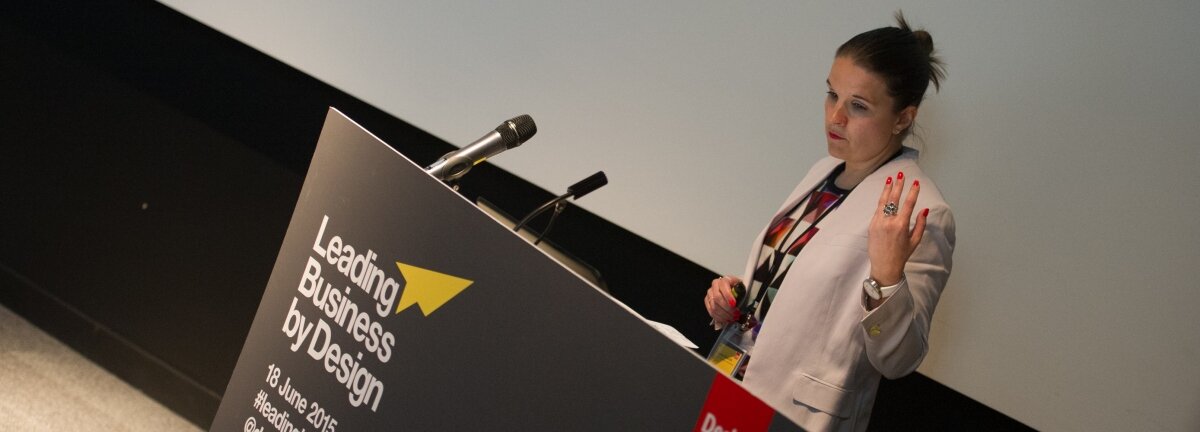Women in Engineering Day: Q&A with Dr Caroline Simcock

For National Women in Engineering Day, we spoke with Dr Caroline Simcock to learn more about her professional path.
Caroline’s career has been inspiring indeed: she holds an MEng and Man in Mechanical Engineering, Manufacturing and Management as well as an Engineering Doctorate (EngD) in Engineered Materials for High Performance Applications in Aerospace and Related Technologies from the University of Birmingham. For 12 years she worked in the aerospace and defence sector at Honeywell Hymatic. In 2010, Caroline joined Dyson, where she was recently appointed as Global Head of Claims, Standards and Insights.
Caroline spoke at our Leading Business by Design Summit last week. She's keen to promote engineering and encourage females in the industry.
What drew you to engineering?
When I went to university, I was looking at architecture as well, and my design teacher at A-level told me that there were some really good opportunities for women in engineering. That was back in the mid-1990s. I didn't even know particularly what engineering was going to entail back then.
I was confident that engineering as a degree was something that you could take to other fields if necessary. So I suppose that was my thinking – that it was a great, well-rounded degree. But of course when I became an engineer, I became very committed to do all I could and to continue to develop as a professional engineer.
Back when I was at Birmingham doing my first degree, there were six females out of 120 in mechanical engineering. And I’ve been in many roles where I’m the only female engineer out of a team.
Why aren’t there more women in engineering today?
I think it probably hinges on a few things. There’s a question of confidence generally, I think, in the female population. Maybe a lack of confidence when confronted with a male majority. But also the subject of engineering sometimes gets press about being a little bit too difficult. So for many females, it’s that question of, will I succeed? I think they’re more likely to take a different path. Where a guy might proceed as was, the female might want to take a route with more confidence.
I also think that the topic of engineering still has a dirty perception, instead of being a subject which is more shiny, more sexy. So sometimes the problem is a perception of what the role entails – how manual or otherwise. I don’t think we help ourselves there. We use the term ‘engineer’ in many different job descriptions, such as a refuse engineer, somebody effectively who collects rubbish. Whereas in the wider Europe, the title is more ‘protected’ if you like.
Why is it essential to have women in engineering?
I think women think differently. So they bring a different perspective, maybe look at a problem from a different angle. It’s good to have a mixture of male and female to get a fully rounded solution. It's essential to have a balance.
How can the industry and educators make engineering more attractive to women?
We’ve got some great industries in the UK; there have been some big steps taken from the medical industry through aerospace and even automotive. We could definitely promote that industry better, show its full life cycle, how engineers are involved in all aspects from specification through to manufacture.
I also think businesses need to engage with individuals. Apprenticeships are a real positive route for individuals to understand the hands-on aspects of the role. Learning on the job as such is key to succeeding and moving forward.
In education, I think the key thing is application. When someone’s taught mechanics or thermodynamics, it’s understanding how and why that’s applicable. I think we’ve made some good steps with introducing more hands-on, engineering-based titled courses.
Engineering has to keep evolving with the needs of society. It may have been traditionally civil, electrical, mechanical, manufacturing even, but to be relevant, to remain relevant, engineering needs to evolve in order to satisfy the needs of industry.
I think more joint partnerships between industry and academia are beneficial in ensuring we’ve actually got the right courses to develop the right talent, be that in whatever market. So for brand-new products like wearables, engineers need good understanding of not only the electronics, the hardware and the software, but also ergonomics, anthropometrics and the materials that are used. I think it’s important that engineers take a rounded approach instead of just focusing on their subject matter.
How important is it for an organisation to have someone championing female engineers at the highest level?
It’s key that the engineers, particularly the engineering grads and those who are junior in their career, have somebody to look up to, to see that there are opportunities to develop and do well.
What’s the key message you’d like to get across for National Women in Engineering Day?
If a female thinks she can succeed, she needs to keep persevering, following her dreams and pushing for what she believes in. She will succeed. It’s perseverance that’s the most important aspect.
Subscribe to our newsletter
Want to keep up with the latest from the Design Council?
